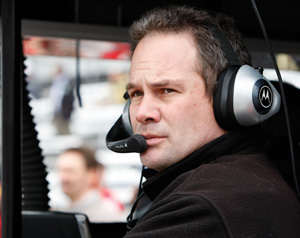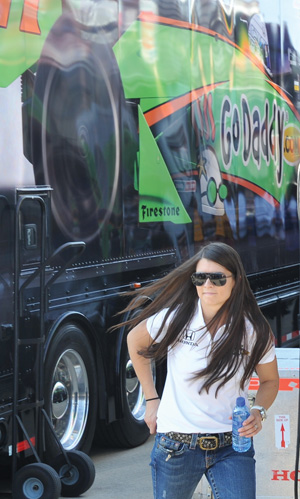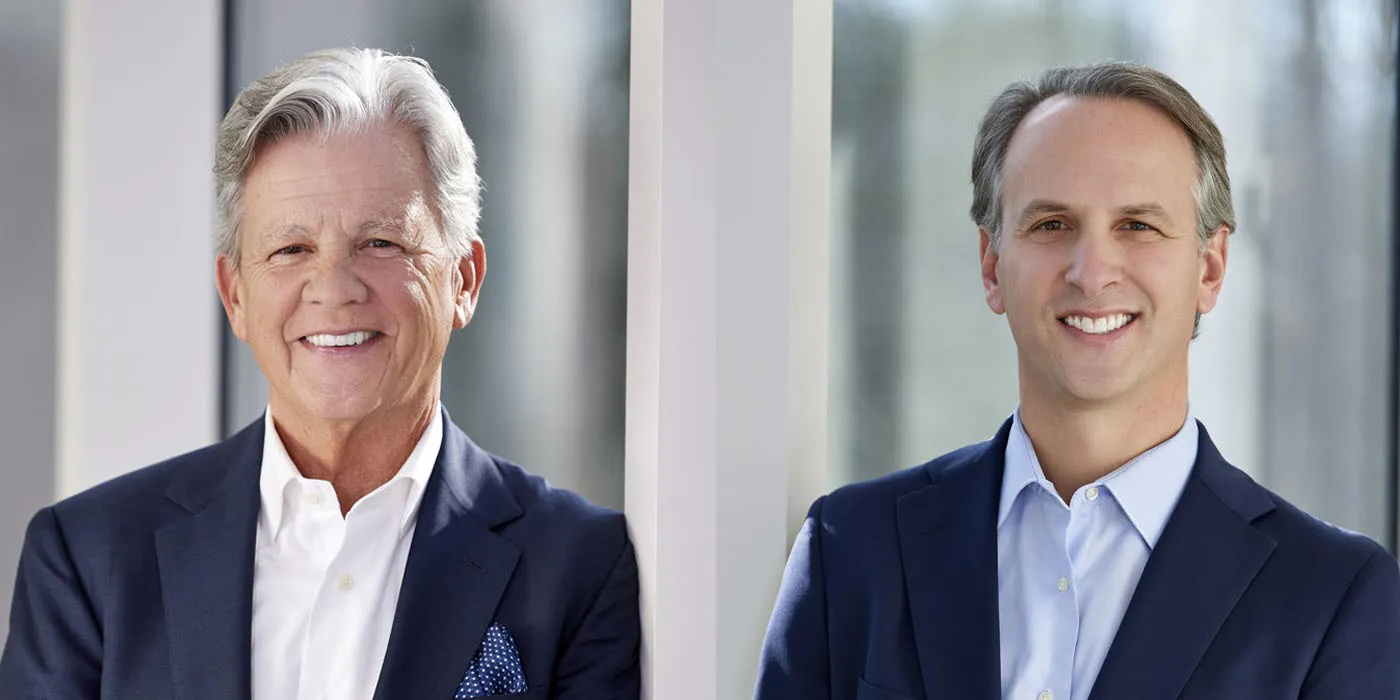I had the opportunity to interview Kyle Moyer, general manager of Andretti Autosport, at the Texas Motor Speedway in Fort Worth, Texas. You never know what to expect when you meet the Big Boss. Knowing he tells folks like Danica Patrick, Marco Andretti and Ryan Hunter-Reay what to do was a bit nerve-wracking. But, Moyer’s humility helped me to keep my nerves in check and carry on to get a good Q&A session with the man who oversees the teams of No. 77 (GoDaddy.com) Danica Patrick, No. 26 (Venom Energy Drink) Marco Andretti, No. 27 (Hire Heroes USA/7-Eleven/Dr. Pepper) Mike Conway and No. 28 (DHL/Sundrop) Ryan Hunter-Reay.
 Moyer began his racing career in 1978 with Bettenhausen Racing, and worked with such organizations as Gurney-Curb Racing and Galles-Kraco Racing. Galles-Kraco employed such drivers as Bobby Rahal and Al Unser Jr. Moyer joined Forsythe-Green Racing in 1993, where he served as the team manager for Jacques Villeneuve in the Toyota Atlantic Championship. Moyer made the move to Team Green in 1994 and here he led his pit team to the first of his teams two consecutive wins in the Indy 500.
Moyer began his racing career in 1978 with Bettenhausen Racing, and worked with such organizations as Gurney-Curb Racing and Galles-Kraco Racing. Galles-Kraco employed such drivers as Bobby Rahal and Al Unser Jr. Moyer joined Forsythe-Green Racing in 1993, where he served as the team manager for Jacques Villeneuve in the Toyota Atlantic Championship. Moyer made the move to Team Green in 1994 and here he led his pit team to the first of his teams two consecutive wins in the Indy 500.
Moyer received the 2005 True Grit award. The award, presented each year at the Indianapolis 500 and the Brickyard 400, acknowledges dedicated crew chiefs and mechanics in the motorsport industry. Established by Chris Paulsen, the award exemplifies outstanding achievement in racing and honors a fellow colleague. Since joining the Indy Car Series, Moyer has directed AGR and Andretti Autosport drivers to several wins from the pit box, one with Bryan Herta in 2003, two in each season of 2004 and 2005 with Franchitti and one with Marco Andretti in 2006. He also helped to pilot Danica Patrick to her win in Motegi, Japan on April 20, 2008.
Wheelus: I would guess that you leaned toward Indy Cars because of the close proximity to your hometown?
Moyer: In Indiana, you play basketball or you race, and I was no good at basketball. So, we went to race every weekend. But being in Indiana did not mean I had to work on Indy Cars. I was tired of working on 9N Ford tractors and farm equipment and I had worked on sprint cars long enough that I did not care to do too much of that any longer.
Wheelus: There is hardly any luck to getting to your position in Andretti Autosport. Early on you worked for Gary Bettenhausen and Dan Gurney. Do you consider those guys your mentors?
Moyer: Gary Bettenhausen was the first mentor, teaching me how to work on sprint cars and turn wrenches there. At Bettenhausen, we had a dirt floor, a band saw, a grinder and a welder and that was about all we had. Then I went out to Gurney’s and we had a CNC machine, making our own cars from the ground up and as many as a car a week. Then all the sudden around 1992, I went to Barry Green and Rick Gallas, who ran a very professional team with very upscale equipment and I learned the business side of how to run things. I take teachings from all of them and that is what helps to make us successful here at Andretti Autosport.
 Wheelus: Has there ever been a moment when everything looked like it was going to go wrong but things turned out right?
Wheelus: Has there ever been a moment when everything looked like it was going to go wrong but things turned out right?
Moyer: Definitely. I loaded up a 1975 truck and loaded, unloaded it and loaded it and unloaded it and reloaded it before running off to California. I had never [really] been outside of Indiana and thought, “Man I am going to make $300 a week and I am going to get the big house and be rich.” When I got there, boy was I wrong. Nobody told me everything in California is three times higher than anywhere else in the country. It was tough but I am better off for it.
Wheelus: Being on top is hard. Getting there is harder and staying there has to be the most difficult.
Moyer: No one stays on top in the racing business, but everyone is working just as hard as the next team. If someone clicks just right and has a bit of luck, preparation and consistency, a team can knock you off. But you just don’t give up. You keep on pushing forward and just because you do not win “The 500,” you do not stop. You get up on Monday and get ready for the next race.
Wheelus: Success doesn’t happen by accident. What does it take to be a continued success in your position?
Moyer: Nobody stands still in racing. Just look at sports records that are being broken every day and people ask, “How is that possible?” It’s [possible] because people work harder every day. New technology has changed everything. The computer systems are so sophisticated. Things are made in a day and can be put on our car the next day and we can test it almost immediately and in between races, instead of a week later. Also, we previously raced every two weeks and now we race every week and parts that used to be made in days and sometimes weeks are ready now in a day. Everything is moving faster and faster, so you have to be ready.
Wheelus: What’s the most important thing you have learned over the years?
Moyer: Patience. That was instilled in me when I was small on the farm and putting out crops one day. The next day it is raining and then it might rain for two weeks. You would think “uh oh” and wonder, “what are we going to do next? Are we going to eat and pay the bills?” My dad would say, “Don’t worry. One day it will dry out and we will get the crops in field.” And the farm just kept on going. I credit my dad for being patient. He instilled it in me that patience was a necessity. It is in your everyday life whether it be the parts store, home or racing.
You have to take each day a day at a time and be patient. It might be bad today but it will be different again later. My way of handling things is to just watch and wait. It is how you react to that problem — if you react negatively it brings everybody down and if you react as if it is no big deal, everyone will keep working. When you react, you stop and everyone else stops. If you keep moving, everyone else will keep moving with you.
Wheelus: In comparison to the parts business, a district manager will have from five to 12 stores with about 25 to 50 people under him. The z of the company I work for has 40-plus stores and about 200 people under him. How do you handle the situation when two teams are not getting along?
Moyer: It is difficult, but you have to think about what is best for the team. If we have a car down then everyone better be willing to fix that car no matter which team they are on. If I see a guy not willing to do that, then that is a guy we are going to cut loose. The biggest thing is that those underneath me have to have their right- and left-hand guys and it is like a pyramid. If there is a block missing then it will not work. We work as a team at Andretti Autosport.
It is all about teamwork and if you do not fit into the team then you are out. If you are a cancer you are out. One bad attitude will spread and good guys can end up with bad attitudes and at times you have to cut those loose that do not keep their attitude straight.




